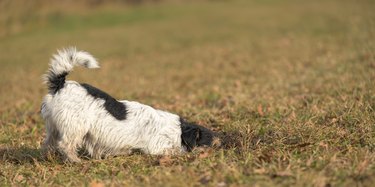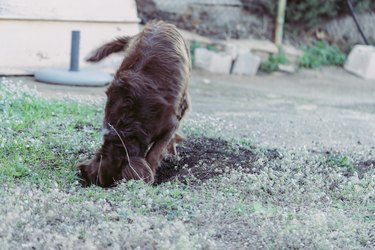Is your pup a button-nosed archeologist who leaves pits and trenches in the wake of their garden excavations? While your dog may be a scientist searching for elusive clues, they're probably also bored, under stimulated, and maybe even anxious. Nonetheless, you can curb this natural behavior by becoming a scientist yourself. All it takes is a little time, patience, and a willing spirit to enrich your dog's life.

Video of the Day
Why do dogs dig holes?
As we explore in this article, digging truly is a natural dog behavior. Unfortunately, it's one that doesn't fit well in modern households with manicured lawns and well-tended landscaping. Still, by understanding why your best friend digs, you can take steps to redirect their behavior into more positive outlets.
Video of the Day
Many dog breeds dig
If your pup regularly quarries the backyard for hidden treasures, it may be because they are destined to do so. Many dogs, like terriers and Dachshunds, were historically bred to dig and capture vermin. Furthermore, a dog's paws and nails are literally designed for digging. Your pup will use their paws as powerful digging tools as readily as they wag their tails, bark, and sniff around the floorboards for a snack.
Your friend needs mental stimulation and physical activity. Rather than correcting their digging instincts, consider channeling this natural behavior into a more acceptable activity. Dog parents can choose between a range of dog sports, agility courses, and clubs that provide dogs (and their humans) with opportunities to productively harness canine instincts.
For example, The American Kennel Club hosts Earthdog trials and clubs that put your dog's digging to good use. Similarly, scent work training is generally considered to be an enriching activity for wayward canines.
Some dog breeds retain their hunting instinct
So many very-exciting-things scurry around and then burrow into the ground. Clearly, your pup must find them all by digging holes. Many dogs still have a prey drive lingering in their DNA. Research published in Applied Animal Behavior Science from State University of New York suggests this behavior manifests as a desire to catch whatever is small and moving in the backyard — moles, mice, beetles, bugs, and other super-fast friends.

Dogs with hiding behavior
Your dog's most precious possessions may end up buried in the ground. This hiding behavior can be even more troubling when they dig multiple holes while trying to remember where that darn tennis ball is buried. If the dog thinks of your flower garden as the First National Bank of Dog, consider not allowing them to take dog toys, bones, and other awesome things outside. If this isn't an option, we have some tips about positive reinforcement training below.
Dogs dig to keep cool
Sometimes dogs dig themselves a cool spot to lie down. This typically happens in the heat of the summer months or when temperatures rise unexpectedly in the spring or fall. In this case, the digging behavior is a signal that your dog is simply too hot and cannot find enough shade to help them regulate their body temperature. As a rule of thumb, your dog's ideal body temperature is around 101 to 102.5°F, as estimated by the Journal of Thermal Biology. Overheating can generally be solved by adding tarps, umbrellas, or another form of shelter for your friend to rest under. Be sure they have access to their water bowl, too.
Digging is exciting for dogs
Dogs frequently dig because they are bored or anxious, and digging holes is an enjoyable pastime when you're a canine. It's a normal way for dogs to alleviate stress, and persistent digging is often a sign that your friend needs more exercise and mental stimulation (remember: Your dog's paws have been designed to dig). This is a cue for you to take them on longer walks more frequently. A tired dog is often a happy and well-behaved dog.
Dogs do what other dogs do
Being a dog is challenging. Your best friend must have one paw in the animal kingdom and the other firmly planted in the human world. Dogs are social, and, based on data published in the Behavioral Processes Journal from the ASPCA, they manage the complexity of daily life through observation. Your pup takes many cues from you, as well as other dogs. You dig in the garden — so maybe they should, too. Similarly, your pup may watch other dogs digging, and, well, that just seems like one heck of a good idea.

Dog digging can be a problem?
While digging can be problematic for your garden oasis, it's often only a health risk to your dog when they dig to escape.
Watch for escaping dogs
Some dogs are escape artists. In this scenario, digging is more means to an end. Once they break free from their yards, dogs are vulnerable to traffic accidents, coyotes, other dogs, and even dangerous humans. Preventing escaping is important, but to do so effectively, first determine why your dog is trying to escape.
Common reasons your dog may be digging to escape:
- Accessing garbage cans
- Finding a mate
- Fleeing from something they find disturbing (phobia)
- Reuniting with you
Once you've identified reasons why your dog is escaping, you can determine the best solution:
- For example, when your hungry pup wants a snack from the trash bin, consider purchasing one with a secured lid.
- If your dog is intact and looking for a mate, it's important to spay or neuter them (this is part of responsible pet stewardship).
- Further, dogs who suffer from an anxiety disorder, may leave the yard to find you. If you suspect that your pup may have anxiety issues, speak with your veterinarian. They can diagnose any medical problems and recommend medication or recommend a dog trainer that specializes with anxiety disorders.
How to Channel Digging in a More Suitable Manner
Establish a “digging zone”
For bowsers who love to bore, consider designating an official digging zone where they can tunnel and burrow to their heart's content. This could be an unused area of your yard or even a sandbox just for dogs — though inspect the sand occasionally to ensure neighborhood cats haven't been "using" it.
Positive reinforcement training
While training takes patience, it's a proven method of human-canine communication. When you observe your dog digging, simply interrupt them with a command or a fun noise — such as shaking beans in a jar (it works!).
Whenever your pup stops, reward them with something positive, like a treat or praise. Through positive reinforcement, you can "tell" your friend to stop. Remember, too, that the power of training is in the repetition. Read our complete guide to positive reinforcement training.
In Summary
Dogs dig holes. It's what they do. Dogs dig for a range of reasons including lack of physical activity, anxiety, regulating body temperature and because of breed characteristics.Yet, pet parents who take the time to understand the reasons behind this behavior can save their flower beds without punishing their friends. In most cases, your dog is digging because you need to step up your game with regular, frequent, and long walks. For others, you'll need to channel your friend's natural instincts into more positive activities like dog sports, agility, and even Earthdog trials or scent work.
- Merck Veterinary Manual: Description and Physical Characteristics of Dogs
- Behavioral Processes Journal: Adapting To The Human World: Dogs’ Responsiveness To Our Social Cues
- Journal of Thermal Biology: Investigating Factors Affecting the Body Temperature of Dogs Competing in Cross Country (Canicross) Races In The UK
- National Association of Canine Scent Work: Home
- American Kennel Club: Earthdog
- Applied Animal Behaviour Science: Canine Behavioral Genetics